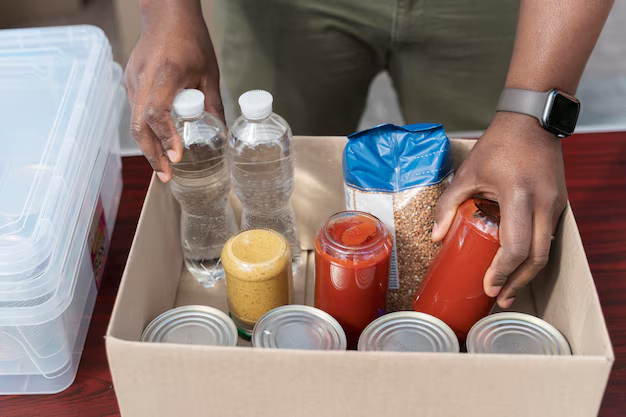Navigating the Path to Food Security: How to Access Food from a Food Bank
In an ideal world, no one would have to worry about their next meal. Unfortunately, reality is different for many individuals and families. Food banks offer a beacon of hope, providing much-needed resources to those facing food insecurity. If you're new to the concept or seeking guidance on how to access these essential services, you're in the right place. This comprehensive guide will walk you through the process of obtaining food from a food bank, offering clear steps, valuable insights, and practical tips to empower you in times of need.
Understanding Food Banks
What Is a Food Bank?
A food bank is a non-profit organization that collects and distributes food to those in need. They play a crucial role in combating hunger by distributing donated food to various agencies, such as soup kitchens and shelters, or directly to the community through food pantries.
How Food Banks Operate
Food banks rely on donations from individuals, businesses, farms, and government programs. They sort and inventory the food, ensuring it meets safety standards before distribution. Volunteers typically power these operations, providing their time and effort to support the cause.
Who Can Benefit from Food Banks?
Eligibility Criteria
While each food bank may have its eligibility requirements, most are open to anyone experiencing food insecurity. Generally, families with limited income, individuals without stable employment, and those facing unexpected financial hardships are considered eligible.
No Judgment Zone
It's important to understand that food banks operate without judgment. Their mission is to provide support during challenging periods, helping bridge the gap until individuals can stabilize their circumstances.
Preparing to Visit a Food Bank
Finding a Local Food Bank
- Search Online: Use search engines or social media to locate food banks in your area. Keywords like "food bank near me" can be helpful.
- Community Resources: Local libraries, community centers, and churches often have information about food banks and their operating hours.
- Call Helpline Services: National helplines can guide you to nearby food banks and provide information on what documentation you might need.
Necessary Documentation
While not all food banks require documentation, having certain papers can expedite the process:
- Proof of Residency: A utility bill or lease agreement.
- Identification: A government-issued ID.
- Household Information: Number of family members, their ages, and any special dietary needs.
Planning Your Visit
- Check Operating Hours: Most food banks have specific days and times for food distribution. Confirm these details beforehand.
- Transport Arrangements: Ensure you have reliable transportation to and from the food bank. If necessary, ask about delivery services for those who cannot travel.
The Experience at a Food Bank
What to Expect
- Registration Process: You may need to fill out a simple form with your personal and household details.
- Friendly Volunteers: Volunteers are usually present to assist and guide you through the process.
- Food Selection: Some food banks allow you to choose items, while others provide pre-packed boxes based on your family's size and needs.
Types of Food Provided
- Staples: Rice, pasta, canned goods, and cereals.
- Fresh Produce: Vegetables and fruits, depending on availability.
- Proteins: Beans, canned meat, and sometimes fresh meat or fish.
- Dairy Products: Milk, cheese, and yogurt, when available.
Making the Most of Your Visit
Be Polite and Grateful
Showing appreciation and politeness creates a positive atmosphere for both you and the volunteers. A simple thank you can go a long way.
Plan Your Meals in Advance
Consider your family's dietary preferences and needs when selecting items. Planning meals can help minimize food waste and ensure balanced nutrition.
Overcoming Common Concerns
Stigma Associated with Visiting Food Banks
It's natural to feel apprehensive, but remember, food banks are there to help. Seeking assistance when needed is a step toward taking control of your situation, and many people have experienced the same challenges.
Dietary Restrictions and Preferences
Communicate any dietary needs or restrictions to the volunteers. They can often tailor food packages to accommodate allergies or specific diets, like vegetarian or gluten-free.
Helpful Tips for First-Time Visitors
Here’s a visually distinct summary of key points to remember:
- 📅 Check Operating Hours: Confirm the day and time before visiting.
- 📜 Bring Necessary Documentation: ID and proof of residency can simplify the process.
- 🛒 Make a List: Know what staples your household needs.
- 🤝 Engage with Volunteers: They are there to help; don't hesitate to ask questions.
- 🥗 Consider Meal Planning: It maximizes the benefits of the food you receive and minimizes waste.
The Broader Impact of Food Banks
Beyond Just Food
Food banks not only provide nourishment but also foster community connections and support networks. Engaging with these resources can open doors to additional services, such as financial counseling, job training, and healthcare referrals.
Volunteering Opportunities
Consider giving back once you're able. Volunteering at a food bank can be an enriching experience, allowing you to support your community and meet others who share your recovery journey.
Building a Supportive Network
Reaching out to local organizations, community centers, or online groups that focus on food security can present opportunities for additional assistance. Sharing experiences and solutions with others in similar situations can empower you and create a valuable support system.
A Closing Insight
Accessing assistance from a food bank is a significant step in ensuring food security for you and your family. By demystifying the process and addressing common concerns, this guide aims to empower you to navigate these resources with confidence. Remember, using a food bank is about resilience and resourcefulness, not weakness. Community support through food banks can provide the vital help needed to stabilize your life and inspire self-sufficiency for the future.

Related Topics
